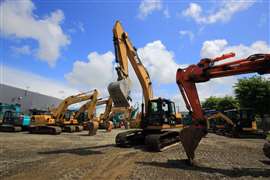RentalTracker: Southern Europe joins in
21 July 2015
If the RentalTracker for the first quarter of 2015 was, as IRN reported, a case of “new year, new positivity”, the three months that followed found the industry reining itself in.
There were still positive percentages in the balance of opinion for all the key indicators, but tempered by a mood of caution among the countries who ranked most optimistic at the start of the year.
Specifically, Nordic countries suffered a drop in confidence after dominating the country-by-country ratings at the end of March. The number of respondents who felt business had grown in the second quarter cancelled itself out against those who thought it had got worse, while the percentage who believed they were operating in a better commercial environment than a year ago fell from 70% to 50%. Perhaps most ominously, only 38% felt assured enough to say that business would be better in 12 months time. This was another first quarter indicator where the feel good factor had reached the 70% mark.
Elsewhere in the RentalTracker - the survey is jointly organised by IRN and the European Rental Association, and is sponsored by Perkins - Germany posted some unspectacular figures despite being regarded as one of Europe’s potentially most lucrative markets.
In terms of current business, growth 12 months ahead, employment and fleet investment, the percentage answering in the affirmative fell in all four categories, and in the case of business in the second quarter itself it fell quite decisively from 36% to 11%.
The other dominant force in the spring survey was Europe’s multinational companies, who by their very nature were able to overcome the problems of individual country markets and direct their resources accordingly.
In the first quarter, this translated to 83% of respondents reporting higher levels of growth than they had enjoyed 12 months previously, but three months later the figure had almost halved. The corresponding question on employment intentions was answered positively by only 11%, compared to 46% in the previous survey.
While northern Europe laboured, for the south of the continent things are looking up. This is particularly the case in Spain, which posted a three-quarters majority in its balance of opinion for the second quarter, while an even higher percentage said that business was better in the past three months than it had been a year ago. Three-quarters of Spanish respondents said they would employ more people during the next quarter, and the country had the joint highest percentage looking to increase fleet investment in the rest of the year - a position probably influenced by its second place in the second quarter’s time utilisation table.
Italy’s market probably never reached the lows that Spain did, but still seems to have been struggling for a very long time. So the country that hosted this year’s ERA Convention will have been relieved to see some of the percentages posted in the second quarter.
It was above the European average for current business conditions, time utilisation and employment intentions, and almost on a par with it for fleet investment. The most remarkable single figure was that half of Italian respondents said they would employ more people in the next quarter, compared to none at all at the end of March.
Whatever good news was coming out of southern Europe, in the case of France everything remains relative. In the first quarter, the RentalTracker was unable to find a single French company able to report better revenues than 2014, or to declare increased time utilisation during the quarter, or even to commit to increased fleet investment in the event of better times ahead.
Thankfully, the latest survey shows that at least some of the gloom has lifted, with almost half of respondents reporting increased time utilisation in the second quarter and close to one-third expecting improved business a year from now. That said, France was at the bottom of both lists and was below the European average on all major indicators. It was also the only country to post a negative balance of opinion on the question of business conditions in the second quarter, with a massive 43% majority for those who felt things had not improved.
The most positive area for France was in employment intentions, with around one in four respondents looking to take on more people in the third quarter, a higher total than Germany, the Nordic countries or the multinationals.
As the home country of Loxam, Europe’s largest rental company, the French market will always be under scrutiny, but arguably the nation most under the microscope during the second quarter was the UK. In fact it would be more accurate to say that the scrutiny came at the end of the quarter,. Which coincided with significant and rapid falls in the share prices of both Speedy Hire and the HSS Group, leading Speedy chief executive Mark Rogerson to resign and the company to issue a profits warning. While HSS’s position was less severe - it announced that it expected sales to return to more normal levels in the second half of the year - it still lost 27% of its share price having floated on the London Stock Exchange as recently as February. Commentators outside the industry were viewing proceedings almost as much in terms of the future of UK rental as a whole as that of the companies themselves.
But if the UK’s obituary had been written, it was premature. As if to bear out HSS’s comment about the second half of the year, a massive 89% reported increased time utilisation during the quarter, and while the percentage of respondents looking to employ more people dropped from 70% to 44%, close to half of the UK companies who completed the survey were looking to increase fleet investment by at least 10% going forward. With the continuing progress of A-Plant, the UK arm of the Ashtead Group, and the healthy first half-year financial results announced by the Lavendon Group, the UK is still viewed as one of Europe’s strongest rental markets, if not the world’s. Its results for the third quarter of the RentalTracker will make interesting reading.
After a small response to the first quarter, which meant it could not be included for comparison with other countries, Benelux came back for the second with a range of broadly positive responses possibly influenced by the business growth being pursued by Netherlands-based companies such as Boels Rental and Riwal. Benelux was above the European average on most of the major indices and close to it in terms of third quarter recruitment plans. Looking across the range of questions covered in the RentalTracker survey, it probably reflected the most consistent performance of any European region.
Having dealt with the individual countries, let’s look at the balances of opinion across the various questions, Europe-wide, compared to the results published in April-May.
The standout figure was in terms of time utilisation, which produced a massive gap of 57% between the companies who were busier than they had been in the first quarter and those who were not. While inevitably, there was an increase in the plus figure and a decrease in the minus, it was interesting to note that the percentage of respondents who said time utilisation was unchanged dropped from 44% to 30%. However, companies saying utilisation was higher rose from 34% to 64%, while those who thought it was lower dropped from 21% to 6%. Effectively, three times as many companies joined the ‘higher’ bracket as the lower one.
Not surprisingly, this translated into a similar pattern for fleet investment, with the proportion of companies increasing their spending rising from 35% to 47%, while those cutting back fell from 22% to 16%, for an overall balance of 31% compared to 13% at the end of the first quarter. Longer term, however, the balance for 2016 is only just over 20%, compared to more than 30% three months ago.
While current business conditions are much the same - down around 2% from the first quarter at 17.5% - in the figure for 2015 compared to a year ago the positive balance has almost doubled from 15% to 29%. The year ahead figure, by contrast, has fallen from 52% to 41%, so it remains to be seen whether the European rental industry has peaked, at least for the time being.
The balance of opinion on employment intentions, however, rose from 22% to 35%, suggesting that at least one more quarter of growth during 2015 may not be out of the question.
For the full RentalTracker feature, including graphs, please see the July-August issue of IRN, which is published next month, or subscribe to the magazine at www.khl.com/subscriptions






